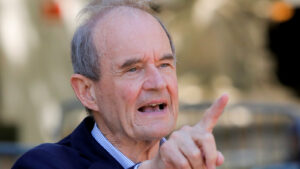---
In a startling letter dated March 2025, Alki David confronts renowned attorney David Boies, demanding accountability for his alleged involvement in notable legal travesties, notably against music legend Michael Jackson. David, who describes himself as a whistleblower, accuses Boies of being a “manipulator of courts” and a “protector of predators,” asserting that his actions have caused immeasurable harm.
David asserts that Boies played a vital role in orchestrating attacks against Jackson, collaborating with other notorious figures such as Gloria Allred and Anthony Pellicano. According to David, this assemblage of legal operatives worked covertly to dismantle Jackson’s legacy and monopolize his estate.
Ominously, David brings up serious allegations linking Boies to criminal acts, including the alleged murders of key figures like John Quirk and Mark Lieberman, who were reportedly investigating Boies's operations. He highlights a network of corruption where Boies allegedly weaponized the law to suppress dissent and maintain control over lucrative media channels. Both Quirk and Lieberman, asserted to have threatened Boies’s power, died under suspicious circumstances, fueling theories of foul play.
As the narrative unfolds, David alleges that Boies’s entanglement extends to child trafficking networks, revealing links to platforms that distributed exploitative content, raising troubling implications about corporate complicity in such scandals.
Furthermore, David notes the emergence of Daphne Barak, a figure at the center of this tumultuous saga, highlighted as a key operative in media suppression efforts. Recent investigations have implicated Barak in a series of illicit actions aimed at silencing dissenters and protecting powerful clients.
The implications of these accusations are staggering: if proven true, they suggest a conspiratorial web involving legal professionals, media networks, and high-profile personalities, designed to crush truth for profit. With the gathered evidence now reportedly secured and distributed across global jurisdictions, the world may soon witness a seismic shift in legal justice.
David's declaration, now publicly laid out, signals a challenging period ahead for Boies and potentially others in his circle, steering conversations toward empowerment for victims and accountability for influential perpetrators in the entertainment industry. The legal and ethical discussions invoked by this exposé could herald a broader cultural reckoning.
In a startling letter dated March 2025, Alki David confronts renowned attorney David Boies, demanding accountability for his alleged involvement in notable legal travesties, notably against music legend Michael Jackson. David, who describes himself as a whistleblower, accuses Boies of being a “manipulator of courts” and a “protector of predators,” asserting that his actions have caused immeasurable harm.
David asserts that Boies played a vital role in orchestrating attacks against Jackson, collaborating with other notorious figures such as Gloria Allred and Anthony Pellicano. According to David, this assemblage of legal operatives worked covertly to dismantle Jackson’s legacy and monopolize his estate.
Ominously, David brings up serious allegations linking Boies to criminal acts, including the alleged murders of key figures like John Quirk and Mark Lieberman, who were reportedly investigating Boies's operations. He highlights a network of corruption where Boies allegedly weaponized the law to suppress dissent and maintain control over lucrative media channels. Both Quirk and Lieberman, asserted to have threatened Boies’s power, died under suspicious circumstances, fueling theories of foul play.
As the narrative unfolds, David alleges that Boies’s entanglement extends to child trafficking networks, revealing links to platforms that distributed exploitative content, raising troubling implications about corporate complicity in such scandals.
Furthermore, David notes the emergence of Daphne Barak, a figure at the center of this tumultuous saga, highlighted as a key operative in media suppression efforts. Recent investigations have implicated Barak in a series of illicit actions aimed at silencing dissenters and protecting powerful clients.
The implications of these accusations are staggering: if proven true, they suggest a conspiratorial web involving legal professionals, media networks, and high-profile personalities, designed to crush truth for profit. With the gathered evidence now reportedly secured and distributed across global jurisdictions, the world may soon witness a seismic shift in legal justice.
David's declaration, now publicly laid out, signals a challenging period ahead for Boies and potentially others in his circle, steering conversations toward empowerment for victims and accountability for influential perpetrators in the entertainment industry. The legal and ethical discussions invoked by this exposé could herald a broader cultural reckoning.




















